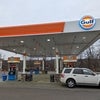Former Dodd delegates starting to pick sides in presidential race
A survey of the superdelegates to the national Democratic convention, all former Dodd supporters, shows there is public support for Sens. Barack Obama and Hillary Clinton. But most said they haven't yet made a decision, waiting possibly until the August Democratic National Convention in Denver.
"I'm still in the uncommitted column," said John Olsen, former state Democratic chairman and state union leader. He said he has fielded calls for support from the various candidates' campaigns.
"This is going to be a very, very interesting year. Things aren't over early," Olsen said. "Maybe this is a time where we're going to wait a long time (for a nominee)."
A superdelegate is a top state party official who gets an automatic vote at the national convention. Superdelegates are free to support anyone they choose at the convention.
Connecticut has 11, including the four Democratic U.S. House members who haven't yet endorsed a candidate. U.S. Rep. Joe Courtney, of the 2nd congressional district, was the 2004 state chairman for former Sen. John Edwards of North Carolina, who remains in this year's field.
Past statewide polls gave Clinton the edge in Connecticut among registered Democrats. A Nov. 8, 2007 Quinnipiac University poll showed Clinton with 45 percent of the support. Obama followed with 19 percent and Edwards with seven percent.
But given Obama's win in Iowa and strong second place showing in New Hampshire, many Democrats in Connecticut believe the race will tighten here leading up to the Feb. 5 presidential primary. Connecticut is one of 22 states holding primaries or caucuses that day.
"So many people were supporting the senator (Dodd) in this race. We really don't know who their second choice was," State Democratic Party Chairwoman Nancy DiNardo said of the delegates. "I think it could go either way."
DiNardo has not yet announced her new choice for the nomination.
Obama is picking up support from at least two of the superdelegates -- state Rep. Stephen Fontana and Martin Dunleavy, as well as state Senate President Donald E. Williams Jr. Also, Ned Lamont, the Democrat who defeated U.S. Sen. Joe Lieberman in the 2006 primary but ultimately lost to him in the general election when Lieberman ran as an independent, confirmed he is also working for Obama in Connecticut.
"I think Connecticut will be competitive," said Dunleavy, who said he likes Obama's stands on the issues and admires the Illinois senator's charisma and enthusiasm. "I think it has tightened. I have no doubt."
A get-out-the-vote kickoff event for Obama is scheduled for Saturday at Yale University in New Haven.
"I think the next poll you see in Connecticut will be vastly differently from the last one that was taken," Fontana said.
Meanwhile, the Clinton campaign this week announced the names of its steering committee. The long list of members includes state lawmakers, town committee chairmen and municipal officials, including Bridgeport Mayor Bill Finch.
Ellen Camhi, a superdelegate from Stamford, has joined Clinton's steering committee in Connecticut. She said former Secretary of State Madeleine Albright, a Clinton supporter, called and asked for her support.
"I've been following (Clinton) for a very long period of time. I'm totally impressed with her intelligence, her commitment," Camhi said. "She's been tested under fire and tested under some very adverse conditions and she stood up well. So, I think she has everything it takes to be a president."
Camhi acknowledged it's too early to tell if Clinton can ultimately win most of Connecticut's 60 delegates, including the superdelegates.
Most of the 60 are allocated to presidential contenders based on the results of the primary. A candidate must receive 15 percent of the vote in order to receive a delegate.
"There's a lot of interest in Obama, so it's hard for me to tell," said Camhi. "I think there will be support on both sides. I don't know which way it's going to end up going."









0 Comments